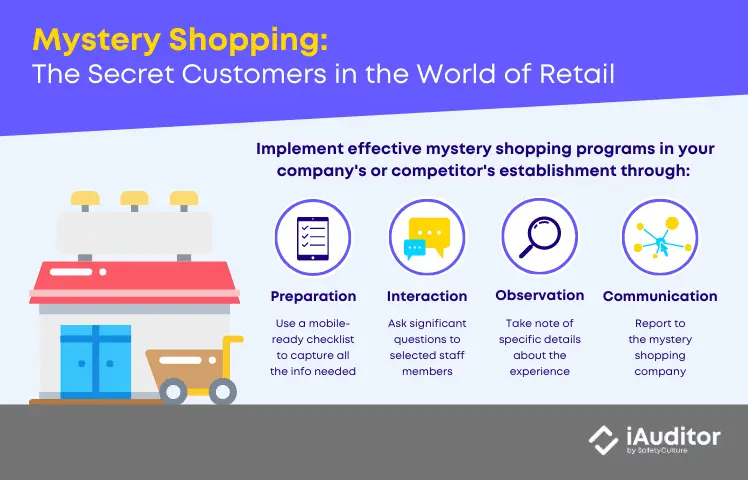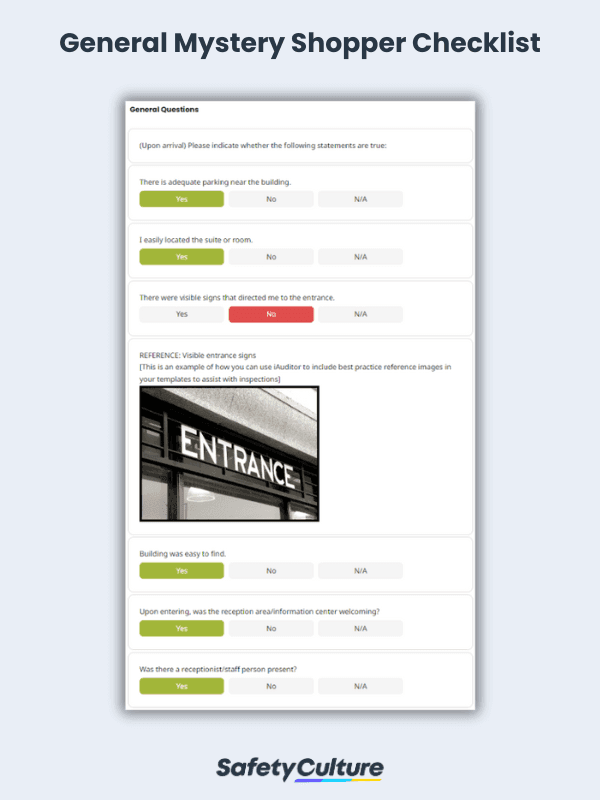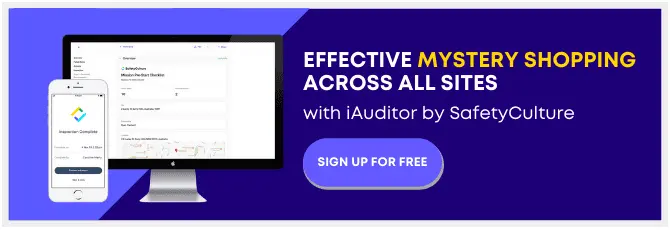What is a Mystery Shopper Checklist?
A mystery shopper checklist is a tool used by secret shoppers to assess and record customer experience feedback. Used by organizations and companies for internal checks or competitive market research purposes, mystery shopper checklists help evaluate the performance of retail establishments, restaurants, hotels, and many other businesses.
Also called mystery shopper forms, mystery shopper checklists typically cover multiple areas of an establishment such as customer service, cleanliness, product quality, service quality, overall layout, and compliance with safety regulations, service guidelines, and business procedures.
What Does a Mystery Shopper Do?
A mystery shopper, also known as a secret shopper, ghost shopper, or anonymous shopper, is usually an agency-employed individual hired by companies to go to actual business premises and provide insight into a typical customer experience. Generally, mystery shoppers “secretly” visit commercial establishments, observe operations, complete specific transactions, interact with staff, and submit reports to employers.
Mystery Shopper Questions
Mystery shopping is a marketing technique used by businesses to collect information that can improve the quality of their products and services. A mystery shopper, or mystery customer, usually does secret shopping to help companies identify areas for improvement to gain an edge over competitors. Mystery shopping can also assist in evaluating the performance of customer-facing employees and verifying compliance with brand standards for any necessary compliance audit.
Mystery shopping checklists contain a list of questions that can guide mystery shoppers on what to do and what to observe during the actual mystery shopper survey. Here are what mystery shoppers typically observe:
Physical features
Mystery shoppers are usually asked to observe the physical features of an establishment—location, signs, parking, cleanliness, ambiance—and provide feedback. This helps determine if an establishment is on-brand and aligned with overarching business goals.
Staff
How the staff interacts with guests and customers, the employees present, and the overall treatment that the mystery shopper receives from the establishment are usually recorded on the mystery shopping checklists to assess if the service provided in an establishment is meeting business expectations and following protocol.
Goods and services
Mystery shopping checklists ultimately will inquire such mystery shopper questions to help assess the quantity and quality of products and services offered at establishments. Feedback from mystery shoppers can provide a unique perspective on the level of quality currently available and can be an opportunity for the business to determine strengths and opportunities for improvement on goods and services.
Types of Mystery Shopping
Since mystery shopping is a legitimate market research activity, organizations typically outsource their secret shoppers from credible mystery shopping companies. Depending on the industry and scope of work, listed below are three of the most common types of mystery shopping jobs in today’s global marketplace:
- Hotel Mystery Shopping
Hotel mystery shoppers are more often referred to as mystery guests, and they usually stay in hotels, motels, bed and breakfasts, resorts, and spas. Hotel mystery shopping aims to help hoteliers improve foundational processes such as check-ins and check-outs, reservations, and bookings. Mystery guests in hotels can also assess in-house facilities, room service, and overall cleanliness. - Restaurant Mystery Shopping
Restaurant mystery shoppers normally lookout for the top two elements that set food service establishments apart: food quality and customer service. Restaurant mystery shopping enables restaurateurs to discover behaviors that boost customer satisfaction, resulting in customer loyalty. Moreover, details of secret shoppers’ dining experiences can help identify gaps in training needs and standardize restaurant operations. - Retail Mystery Shopping
Arguably, the most common type of mystery shopping involves retail stores such as supermarkets, department stores, and clothing outlets, among others. Retail mystery shoppers tend to focus on the path to purchase, employee performance and behavior, and store appearance. Retail mystery shopping can provide valuable information to build positive customer relationships on the frontline, increasing sales and retention.
How Mystery Shopping Is Done with Examples

Mystery shopping is done by an organization hiring a secret shopper as a customer entering their own or a competitor’s business to grade a product and/ or service offering. A good mystery shop or visit will set specific information-gathering objectives. Here are some examples of how mystery shopping is usually done:
- Mystery Shopping Example Scenario #1:
If a restaurateur aims to gauge the overall customer experience, then he/ she would ask the mystery shopper to simply visit the restaurant, order a meal, and generally grade the experience. The mystery shopper would typically be asked to assess the restaurant’s appearance, waitstaff, food, and timeliness. - Mystery Shopping Example Scenario #2:
If a retailer wants to evaluate the handling of returns, they would normally be more specific and set detailed instructions for the mystery shopper to follow. For example 1) purchase a specific item; 2) leave the store; 3) return to a different attendant; and 4) make a specific statement to the attendant about the purchase error. The mystery shopper would then be asked a series of questions grading the overall experience.
Whether it is general or specific information-gathering mystery shopping, a checklist is typically used to ensure consistency in measuring experiences.
Mystery Shopping Benefits
With the global economy evolving toward omnichannel commerce, mystery shopping has never been more vital as a sales and merchandising tool for retailers. Customers in the digital age can also easily broadcast their experience with a certain brand—whether good or bad. Maximize the following benefits of mystery shopping in an organization:
- Gain Customer Feedback – Businesses can get multiple customer perspectives through a mystery shopper, such as the establishment’s ambiance, the kind of service customers get, the overall cleanliness of the place, and how employees present themselves. These are only a handful of invaluable information that can be gathered through a mystery shopper posing as a customer.
- Reinforce and Verify Policies – With effective secret shopping programs, verifying if newly cascaded policies are followed by different branches or departments can be confirmed. Moreover, it can be determined if those rolled-out directives are truly effective across the board.
- Check on the Competition – Being able to compare the service provided and products offered by one’s company and competitors can give unprecedented insight on which areas to improve. Implementing findings from secret shopping can also help consistently position the business to stand out and gain an edge over competitors.
What are the Disadvantages of Mystery Shopping?
While mystery shopping in one’s environment or competitors’ premises has become more prevalent over the years, it is undeniable that there are a few caveats to this industry practice. Disadvantages of mystery shopping include, but are not limited to:
- Insufficient Data – In some cases, mystery shoppers can be too caught up in the moment (e.g. dining at a restaurant or staying in a hotel) to gather all the valuable information that gives a better picture of how service was provided an establishment. Nevertheless, a reliable checklist that the secret shopper can depend on can provide directions on what to observe or look out for.
- Personal Bias – Secret shopping is subjective to the biases of the mystery shopper and can be influenced by circumstances of the day.
- Upset Employees – The whole secrecy surrounding mystery shopping can be uncomfortable and may cause anxiety to employees. The employees’ unease may influence how they interact with customers, particularly if they are aware of or anticipating the arrival of a mystery shopper.
Mystery Shopping Tips
Having weighed the benefits and disadvantages of performing a mystery shop, consider the following tips with guide questions when setting up a mystery shopping survey or self-assessment for your company:
- Set Your Goals: What do you want to achieve?
Do you intend to check on how your products and services fare versus your competitors’ products and services? Do you want to know if standards rolled out recently are being followed by frontline staff? Will you keep the secret shopping secret or will you let the word out that employees should expect a mystery shopper anytime? - Know the Costs: How much will you spend?
Will it be more cost-effective if you have your internal market research team do the mystery shopping or will it be better to hire the services of a mystery shopping company? - Prepare Instructions: What should you observe?
What questions should you ask? Work closely with your market research team or with your partner mystery shopping company and formulate a list of to-do and questions that you intend your mystery shopper to fill out. - Utilize Tools: How can you “secretly” shop?
A mobile device is more discreet and convenient than a piece of paper. Secret shoppers can use a mobile app like SafetyCulture to fill out pre-made industry checklists. With SafetyCulture, mystery shoppers can generate and submit detailed reports even before leaving commercial establishments.
How to Write a Mystery Shopper Report
Mystery shopper reports should be created according to the specifications of the hiring company or agency but they should always be accurate, unbiased, and comprehensive. They should provide clients insight on how to improve their products and services, as well as track competitor performance. Follow the steps below to write a mystery shopper report:
- Indicate the correct primary information – Start the report by making sure that all data such as product name, staff name, store location, and time and date of mystery shopping are accurate.
- Include generic to specific observations – Go through the store experience by observing general areas to very specific ones such as staff members, service, environment, and overall impression. Describe them as needed, but don’t stray away from the relevant areas of the report.
- Use a rating system – It would be helpful to utilize responses that clearly specify the situation in each different area of the store. This can include answers such as yes, no, not satisfied, satisfied, and excellent, among others.
- Attach image reference – Increase information accuracy by directly adding images to the report while mystery shopping.
- Add notes and recommendations – Provide further insights into the report to strengthen its credibility and add explanations to any issues or areas of concern found.



